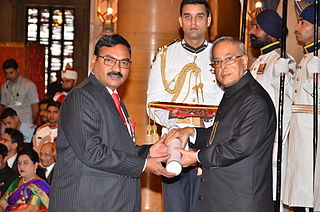Small and medium-sized enterprises (SMEs) or small and medium-sized businesses (SMBs) are businesses whose personnel and revenue numbers fall below certain limits. The abbreviation "SME" is used by international organizations such as the World Bank, the European Union, the United Nations, and the World Trade Organization (WTO).

Dalit, also previously known as untouchables, is the lowest stratum of the castes in the Indian subcontinent. Dalits were excluded from the four-fold varna system of Hinduism and were seen as forming a fifth varna, also known by the name of Panchama. Dalits predominantly follow Hinduism, with significant populations of the adherents of Buddhism, Sikhism, Christianity, and Islam. Scheduled Castes is the official term for Dalits, who get reservation under Positive discrimination, as per the constitution of India.
Indian hip hop is a genre of popular music developed in India. Desi hip hop is a term for music and culture which combines the influences of hip hop and the Indian subcontinent; the term desi referring to the South Asian diaspora. The term has also come to be used as an alternative for rap music and even pop music which involves rappers of South Asian origins.
Dalit Voice was a political magazine published in Bangalore, India. The current full title is "Dalit Voice: the voice of the persecuted nationalities denied human rights" and it appears fortnightly in both internet and print formats. It was founded in 1981 by V.T. Rajshekar, a former journalist for the Indian Express, who was also its editor. It was the largest circulated Dalit journal in India.

Viduthalai Chiruthaigal Katchi formerly known as the Dalit Panthers of India or the Dalit Panthers Iyyakkam is an Indian social movement and political party that seeks to combat caste based discrimination, active in the state of Tamil Nadu. The party also has a strong emphasis on Tamil nationalism. Its chairman is Thol. Thirumavalavan, a lawyer from Chennai and its general secretary is the writer Ravikumar.

Shiv Nadar is an Indian billionaire industrialist and philanthropist. He is the founder and chairman emeritus of HCL Technologies and the Shiv Nadar Foundation. Nadar founded HCL in the mid-1970s and transformed the IT hardware company into an IT enterprise over the next three decades. In 2008, Nadar was awarded Padma Bhushan for his efforts in the IT industry. Nadar, nicknamed by friends as Magus, since the mid-1990s he has focused his efforts on developing the educational system of India through the Shiv Nadar Foundation. According to Forbes, he is the 3rd richest person in India and the 50th richest person in the world with an estimated net worth of US$30 billion as of June 2023.
Dalit literature is a genre of Indian writing that focuses on the lives, experiences, and struggles of the Dalit community, who have faced caste-based oppression and discrimination for centuries. As Jobymon Skaria explains, "Dalit literature has been the most potent literary expression of Dalits' daily struggle for human dignity." This literature encompasses various Indian languages such as Marathi, Bangla, Hindi, Kannada, Punjabi, Sindhi, Odia and Tamil and includes diverse narratives like poems, short stories, and autobiographies. The movement originated in response to the caste-based social injustices in mid-twentieth-century independent India and has since spread across various Indian languages, critiquing caste practices and experimenting with different literary forms.

Kalpana Saroj is an Indian entrepreneur and a Tedx speaker, and the chairperson of Kamani Tubes in Mumbai, India.

The Nepalese Ministry of Minister of Industry, Commerce and Supplies is a governmental body of Nepal to monitor and manage industries of the country.
The Dalit Indian Chamber of Commerce and Industry (DICCI) is an Indian association that promotes business enterprises for Dalits. It was founded in 2005 by Milind Kamble. Some of the key members of DICCI are Kalpana Saroj, Chandra Bhan Prasad and Rajesh Saraiya.

Ravi Kumar Narra is an Indian businessman and social worker from Secunderabad, known for his efforts for the upliftment of the dalit community. He was honoured by the Government of India, in 2014, by bestowing on him the Padma Shri, the fourth highest civilian award, for his services to society.

Divyank Turakhia is an Indian-born computer-programmer, businessman, billionaire, serial entrepreneur, and investor. His net worth is estimated at $1.76 billion. He founded Media.net, which he sold in 2016 to a Chinese consortium for $900 million, the third-largest ever ad-tech deal.

PayU is a Netherlands-based payment service provider to online merchants. The company was founded in 2002, and is headquartered in Hoofddorp. It allows online businesses to accept and process payments through payment methods that can be integrated with web and mobile applications. As of 2018, the service is available in 17 countries. The firm is owned by the Naspers Group, which also owns a stake in one of its sister companies, Tencent.
Dalit Camera is a news website and YouTube channel set up in 2011 by Raees Mohammed to document life in India from the perspective of Dalit, Adivasi and Bahujan people and other minorities living in India. It has been described as the first use of videos uploaded on social media to highlight the difficulties faced by Dalit students.
Milind Kamble is an Indian entrepreneur notable for establishing Dalit Indian Chamber of Commerce and Industry (DICCI) and working for Dalit entrepreneurs and Dalit businesses. He received Padma Shri, India's fourth highest civilian honour in 2013.
Connect2India is an international trading platform that enables micro, small and medium enterprises (SMEs) to import from and export to India.
Dalit music or Bahujan music is music created, produced, or inspired by Bahujans and Dalits, people often discriminated against on the basis of caste, including Dalit rock, Bhim rap and Dalit pop as well as the music genres of the Ravidasis, including Chamar pop, Bhim Palana, Bhim geet and Punjabi Ambedkarite music.
Hari Kishan Pippal is a leather exporter from Agra, India. He used to pull rickshaws earlier but now owns a number of companies.
The Uthapuram caste wall, called by various names as the wall of shame, the wall of untouchability is a 12 ft high and 600 meter long wall built by dominant caste villagers reportedly to segregate the Dalit population in the Village of Uthapuram in Tamil Nadu. The village witnessed violence between Dalits and the dominant castes during 1948, 1964 and 1989 and was also known for its caste based discrimination.